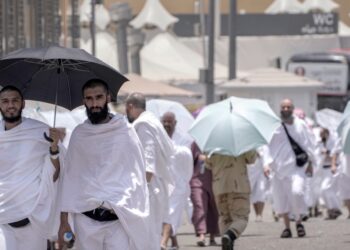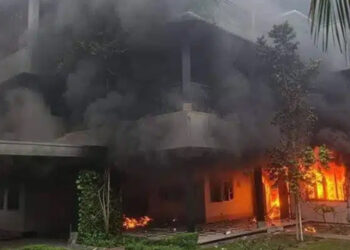![]() Follow Us on Google News
Follow Us on Google News
Four Hindu women have moved the Supreme Court of India, urging the excavation and scientific survey of a sealed section of Gyanvapi Mosque, located in Varanasi, Uttar Pradesh.
This plea comes just four days after an Archaeological Survey of India (ASI) report asserted the existence of a large Hindu temple predating the mosque’s construction, providing a boost to Hindu petitioners embroiled in a longstanding legal battle.
The ASI Findings:
According to the lawyer representing Hindu petitioners, Vishnu Shankar Jain, the ASI’s comprehensive 800-page report reveals that the 17th-century Gyanvapi mosque was erected after the demolition of a pre-existing Hindu temple at the same site. Notably, alleged remnants of Hindu god statues were reportedly unearthed in the mosque’s basements during the survey.
The report suggests that the original structure was dismantled during the reign of Mughal emperor Aurangzeb, with some parts repurposed in the construction of the mosque. This revelation has reignited the legal dispute over the ownership and usage of the Gyanvapi Mosque.
Legal Implications:
In response to the ASI findings, Hindu petitioners are set to approach the Supreme Court seeking access to a designated area within the mosque premises for Hindu worship. On the opposing side, Muslim lawyers involved in the case dispute the claims but have yet to provide specific details.
The ongoing legal tussle echoes a similar situation in Ayodhya, where the recent inauguration of a grand Hindu temple by Prime Minister Narendra Modi took place. The Ayodhya temple’s construction site was said to be the location of a 16th-century mosque demolished in 1992, leading to communal tensions.
Muslims’ opinion:
Indian Muslims assert that the Gyanvapi Mosque is a legitimate historical Islamic structure commissioned by Emperor Aurangzeb. They emphasize its centuries-old role as a place of Islamic worship, attributing historical and religious significance to the mosque.
Historical Context and Escalation:
The controversy surrounding the Gyanvapi Mosque dates back to 1991 when legal petitions were filed by Hindu groups claiming that the mosque was built over a demolished Hindu temple. The Muslim community contends the mosque’s historical legitimacy and its continuous use for Islamic worship.
In 2021, the situation intensified with demands for archaeological surveys and court-ordered video inspections. These inspections aimed to reveal objects claimed by Hindus as evidence of a former temple, adding a layer of complexity to the longstanding legal and religious disputes surrounding the site.
As the nation grapples with these historical revelations, the Gyanvapi Mosque remains at the center of a complex and emotionally charged legal battle, fueling discussions on religious coexistence and historical preservation.































